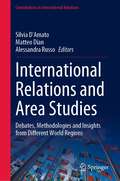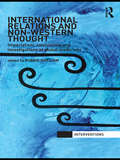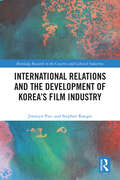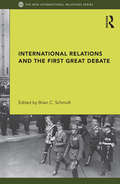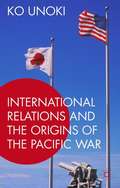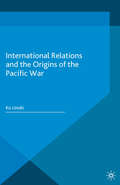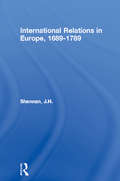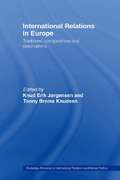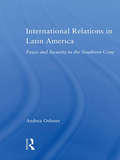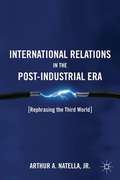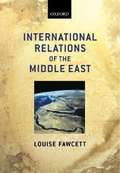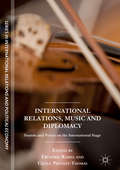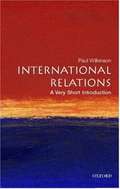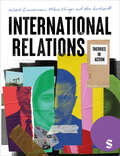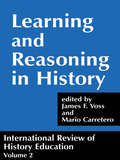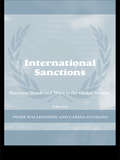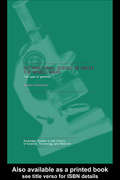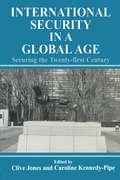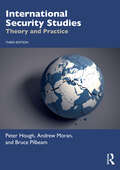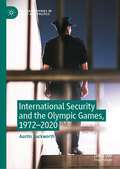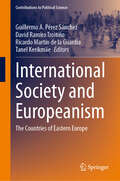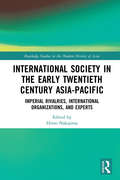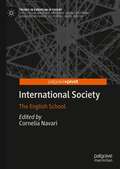- Table View
- List View
International Relations and Area Studies: Debates, Methodologies and Insights from Different World Regions (Contributions to International Relations)
by Matteo Dian Alessandra Russo Silvia D'AmatoDiscover the intricate tapestry of international politics and governance with this book. The book delves into the diverse nature of globally significant actors and systems across multiple regions. From Africa to Asia, Europe to the Middle East, this collection of thought-provoking case studies explores the role of regional actors in the international system. Combining theoretical innovation with empirical analysis, this volume expands the boundaries of International Relations (IR) and Area Studies (AS), showcasing their interconnections throughout history and in contemporary contexts. Through illuminating case studies drawn from the fields of "Comparative Regionalism" and "Non-Western IR Theory," the book sheds light on pressing international events. Unpacking complex questions, the contributors examine the application of IR scholarship to global events and provide fresh insights into political dynamics, conflicts, and state instability across various regions. By offering a comparative perspective on threats, political contestation, and security policies, this book challenges existing perspectives and enriches the debate. With its methodological and epistemological explorations, this book is an indispensable resource for scholars and students of international relations and security studies, as well as researchers focusing on specific world areas. Embark on a captivating journey through the multifaceted landscape of global affairs.
International Relations and Non-Western Thought: Imperialism, Colonialism and Investigations of Global Modernity (Interventions)
by Robbie ShilliamInternational Relations, as a discipline, tends to focus upon European and Western canons of modern social and political thought. Alternatively, this book explores the global imperial and colonial context within which knowledge of modernity has been developed. The chapters sketch out the historical depth and contemporary significance of non-Western thought on modernity, as well as the rich diversity of its individuals, groups, movements and traditions. The contributors theoretically and substantively engage with non-Western thought in ways that refuse to render it exotic to, superfluous to or derivative of the orthodox Western canon of social and political thought. Taken as a whole, the book provides deep insights into the contested nature of a global modernity shaped so fundamentally by Western colonialism and imperialism. Now, as ever, these insights are desperately needed for a discipline that is so closely implicated in Western foreign policy making and yet retains such a myopic horizon of inquiry. This work provides a significant contribution to the field and will be of great interest to all scholars of politics, political theory and international relations theory.
International Relations and the Development of Korea’s Film Industry (Routledge Research in the Creative and Cultural Industries)
by Jimmyn Parc Stephen RangerThis book examines the evolution of the Korean film industry, presenting a comprehensive account from the early days of experimental screening to its current period of attracting increased foreign investment.Exploring the Korean film industry’s troubled past, this book covers occupation, civil war, authoritarianism, globalisation, and the continued uncertainties amidst geopolitical competition. It differs from other existing works by connecting the development of the Korean film industry to the country’s international relations. Furthermore, it considers what impact this had on the industry itself rather than just on the content of the films produced. With such an approach, this book reveals the background and reasons for its achievements, ultimately providing an inspiring example of global success and an applicable benchmark for other film industries seeking their own international breakout.By offering fresh insights and new information linking the past and present of the Korean film industry, the book serves as a useful companion to scholars of cultural studies, business history, Korean studies, and globalisation, even if they may not be familiar with the specifics of this dynamic industry. Moreover, this book can serve as a valuable reference for shaping the roadmap of audiovisual sectors—including the film industry—toward a promising future.
International Relations and the First Great Debate (New International Relations)
by Brian C. SchmidtThis book provides an authoritative account of the controversy about the first great debate in the field of International Relations. Of all the self-images of International Relations, none is as pervasive and enduring as the notion that a great debate pitting idealists against realists took place in the 1940s. The story of the first great debate continues to structure the contemporary identity of International Relations, yet in recent years revisionist historians have challenged the conventional wisdom that the field experienced such a debate. Drawing on expert contributors working in Canada, Europe, the United Kingdom, and the United States, this book includes key participants in the historiographical controversy. The book assembles the existing scholarship and provides a thorough analysis of the status of the first great debate in the history of International Relations. It is an invaluable examination of the causes and future direction of idealist and realist arguments. International Relations and the First Great Debate will be of interest to students and scholars concerned with the foundations of International Relations.
International Relations and the Origins of the Pacific War
by Ko UnokiInternational Relations and the Origins of the Pacific War takes the unique approach of examining the history of the relationship between Japan and the United States by using the framework of international relations theories to search for the origins of the Pacific War, that erupted with Japan's attack on Pearl Harbour in 1941.
International Relations and the Origins of the Pacific War
by Ko UnokiInternational Relations and the Origins of the Pacific War takes the unique approach of examining the history of the relationship between Japan and the United States by using the framework of international relations theories to search for the origins of the Pacific War, that erupted with Japan's attack on Pearl Harbour in 1941.
International Relations in Europe, 1689-1789 (Lancaster Pamphlets)
by J. H. ShennanShennan examines the changing criteria upon which European relations were based between 1689 and 1789, a complex period which saw: * the decline of dynasticism * the emergence of economic power as a concomitant of military might * the growth of British influence * the dawn of nationalism For easy reference, this book also contains extensive chronologies of the important battles, treaties and alliances of the period, along with a list of further reading.
International Relations in Europe: Traditions, Perspectives and Destinations (Routledge Advances in International Relations and Global Politics #Vol. 44)
by Knud Erik Jørgensen Tonny Brems KnudsenA new and illuminating critical examination of international relations in Europe. This new volume presents all of the state of the art thinking, focusing particularly on international relations theory and theoretical debates in Western and Central European countries.The contributors seek to strengthen knowledge about different ways of cultivating the discipline; to intensify pan-European communication concerning IR theory; to contribute to improving the quality of theorizing; and finally to consider future directions for the discipline in Europe. The main issues addressed include: the historical development of the discipline; factors driving IR theorizing; the institutional and cultural context of theorizing; 'homegrown' theory-building vs. theory import; patterns of traditional and new discourse; and the diversity of disciplinary traditions.
International Relations in India
by Kanti P. Bajpai Siddharth MallavarapuThis reader is a collection of first-rate theoretical engagements relating to International Relations from across India.
International Relations in Latin America: Peace and Security in the Southern Cone
by Andrea OelsnerThis work studies the development of bilateral relations in two pairs of states (dyads): Argentina-Brazil and Argentina-Chile. It takes on a moderate constructivist approach that incorporates into the analysis of international relations the role of identities, ideas and perceptions as well as of material forces, and understands that the former are affected and changed during interaction. It also uses to securitization theory to explain how issues come or cease to be considered security matters through social constructions.
International Relations in the Post-Industrial Era
by Jr. Arthur A. NatellaThe current emphasis on the greening of the world marks a beginning of a new concern for our relationship with our planet. This book states that we are entering into a new era - a transitional time in history in which the values of the industrial revolution are being replaced by a post-industrial consciousness.
International Relations of the Middle East
by Louise FawcettThis book aims to provide the reader with a comprehensive, yet accessible guide for understanding the International Relations of the Middle East in the last century. Few parts of the world have been quite so buffeted by conflict and war; few parts of the world so much written about and debated in recent times, while at the same time remaining so subject to misunderstanding and stereotype. As one scholar wrote, reflecting on the legacy of fifty years of academic study of the region: 'Middle Eastern political processes defy observation, discourage generalization and resist explanation' (Bill 1996: 503). This volume is designed to improve our understanding of the Middle East by contemplating its International Relations in broad terms. These two subject areas, International Relations and Middle East politics, are highly interdependent, as even a cursory survey of major works shows. No book on the Middle East can afford to ignore the way that external forces have shaped the development of the region's politics, economics and societies, or indeed how the region itself has contributed to frame and shape the global environment. Similarly, no International Relations text can afford to ignore the rich case studies that the Middle East has supplied, and how they illuminate different theories and concepts of the discipline. It is a surprising feature of the literature, that despite advances in recent years, relatively little work has been done to bring these subject areas closer together. While other regions of the world appear to have been more susceptible to such exercises, Middle East Studies and International Relations continue to stand apart in an uneasy and often unfamiliar relationship (Tessler et al. 1999). Also taken from book.
International Relations, Music and Diplomacy
by Frédéric Ramel Cécile Prévost-ThomasThis volume explores the interrelation of international relations, music, and diplomacy from a multidisciplinary perspective. Throughout history, diplomats have gathered for musical events, and musicians have served as national representatives. Whatever political unit is under consideration (city-states, empires, nation-states), music has proven to be a component of diplomacy, its ceremonies, and its strategies. Following the recent acoustic turn in IR theory, the authors explore the notion of “musical diplomacies” and ask whether and how it differs from other types of cultural diplomacy. Accordingly, sounds and voices are dealt with in acoustic terms but are not restricted to music per se, also taking into consideration the voices (speech) of musicians in the international arena.Read an interview with the editors here: https://www.sciencespo.fr/ceri/en/content/international-relations-music-and-diplomacy-sounds-and-voices-international-stage
International Relations: A Very Short Introduction
by Paul WilkinsonOf undoubtable relevance today, in a post-9-11 world of growing political tension and unease, this Very Short Introduction covers the topics essential to an understanding of modern international relations. Paul Wilkinson explains the theories and the practice that underlie the subject, and investigates issues ranging from foreign policy, arms control, and terrorism, to the environment and world poverty. He examines the role of organizations such as the United Nations and the European Union, as well as the influence of ethnic and religious movements and terrorist groups which also play a role in shaping the way states and governments interact. This up-to-date book is required reading for those seeking a new perspective to help untangle and decipher international events.
International Relations: Theories in Action
by Hubert Zimmermann Milena Elsinger Alex BurkhardtThe definitive applied theory textbook that helps you make sense of global issues through theoretical concepts. Not presupposing any prior knowledge, this introduction equips you with the skills to use theories as adaptable tools to tackle complex global issues. Adopting a critical and questioning approach, you will be equipped in theory as a series of tools to be used, adapted, combined, and applied when grappling with some of the most contested issues in global politics. Theoretical perspectives are brought alive as a vital tool to understand concrete historical and contemporary examples. This indispensable text starts by examining key theories spanning constructivism and postcolonialism to realism and liberalism with a real-world perspective which prioritises empirical purchase. From here, chapters take a critical, questioning approach to tackle core problems of international politics – from armed conflict and financial markets to the climate crisis, global inequality, gender and race. This text is the ideal companion for all undergraduate and postgraduate students of global affairs. Hubert Zimmermann is Professor of International Relations at Philipps University of Marburg, Germany. Milena Elsinger is Head of the student information department at Philipps University of Marburg, Germany. Alex Burkhardt teaches at the Bundessprachenamt in Koblenz, Germany and previously taught at Philipps University Marburg, Germany.
International Relations: Theories in Action
by Hubert Zimmermann Milena Elsinger Alex BurkhardtThe definitive applied theory textbook that helps you make sense of global issues through theoretical concepts. Not presupposing any prior knowledge, this introduction equips you with the skills to use theories as adaptable tools to tackle complex global issues. Adopting a critical and questioning approach, you will be equipped in theory as a series of tools to be used, adapted, combined, and applied when grappling with some of the most contested issues in global politics. Theoretical perspectives are brought alive as a vital tool to understand concrete historical and contemporary examples. This indispensable text starts by examining key theories spanning constructivism and postcolonialism to realism and liberalism with a real-world perspective which prioritises empirical purchase. From here, chapters take a critical, questioning approach to tackle core problems of international politics – from armed conflict and financial markets to the climate crisis, global inequality, gender and race. This text is the ideal companion for all undergraduate and postgraduate students of global affairs. Hubert Zimmermann is Professor of International Relations at Philipps University of Marburg, Germany. Milena Elsinger is Head of the student information department at Philipps University of Marburg, Germany. Alex Burkhardt teaches at the Bundessprachenamt in Koblenz, Germany and previously taught at Philipps University Marburg, Germany.
International Review of History Education: International Review of History Education, Volume 2
by Mario Carretero James F. VossThis volume consists of the proceedings of an international conference on cognition and instruction in history. The papers cover several areas: historical narratives and history teaching; the use of texts, documents and images in learning history; and historical explanation and understanding.
International Sanctions: Between Wars and Words (Cass Series on Peacekeeping #Vol. 21)
by Peter Wallensteen Carina StaibanoThe main theme of the book is that the new types of sanctions constitute a challenge to the international system. First, there are more of the targeted sanctions, including financial, travel, aviation, special commodity and arms sanctions. Furthermore, there are considerable but varied practices in implementation. Also there are now sanctions by new actors (regional bodies, international organizations). These all put new strains on international bodies in carrying out sanctions or getting member states to work together in these efforts. These challenges are analyzed in this volume, with some examples, but mostly from a generalist perspective. A completely novel aspect is that this volume also includes studies of the difficulties that are met by targeting actors, their way of managing the situations, and most interesting, the human rights of such actors.
International Science Between the World Wars: The Case of Genetics
by Nikolai KrementsovWhat is international science and how does it function? This book answers these questions through a detailed study of international congresses on genetics held from 1899 to 1939. It presents a portrait of international science as a product of continuous interactions that involved scientists and their patrons within specific political, ideological, and disciplinary contexts. Drawing on a variety of archival sources - ranging from Stalin's personal papers to the records of the Gestapo and from the correspondence among scientists in different countries to the minutes of the Soviet government's top-secret meetings - it depicts the operations of international science at a time of great political tensions.Krementsov breaks with the view of science as either inherently national or quintessentially international, examining instead the intersection between national and international agendas in scientists' activities. Focusing on the dramatic history of the Seventh international genetics congress, he investigates contradictions inherent to scientists' dual loyalties to their country and their science. Through analysis of negotiations among three groups of actors involved with the organization of the congress, Krementsov examines the role of ideologies, patronage, and personal networks in the operations of international science.
International Security Issues in a Global Age: Securing the Twenty-first Century
by Clive JonesThis volume examines the new, the changing, and the enduring features of international security in the post-Cold War era. In so doing, it examines the extent to which present state structures and institutions have been able to adapt and accommodate themselves to the diversity of security threats.
International Security Studies: Theory and Practice
by Peter Hough Andrew Moran Bruce PilbeamFully revised to incorporate recent developments, this third edition of International Security Studies provides students with a comprehensive and accessible textbook on security with a particular emphasis on the use of case studies to illustrate theoretical debates.In addition to presenting the major theoretical perspectives, the book examines a range of important and controversial topics in covering both traditional military and non-military security issues such as nuclear proliferation, humanitarian intervention, food security and environmental security. Unlike most standard textbooks, the volume also offers a wide range of case studies – including chapters on the US, China, the Middle East, Russia, East Africa and the Arctic – providing detailed analyses of important global security issues and the application of theoretical debates to major contemporary issues.The 36 chapters contain pedagogical features such as textboxes, summary points and recommended further reading, and are divided into five thematic sections: Conceptual and theoretical Military security Non-military security Institutions and security Case studies This textbook will be essential reading for all students of security studies and highly recommended for students of critical security studies, human security, peace and conflict studies, foreign policy and International Relations in general.
International Security and the Olympic Games, 1972–2020 (Palgrave Studies in Sport and Politics)
by Austin DuckworthDrawing on new archival documents and interviews, this book demonstrates the evolving role of international politics in Olympic security planning. Olympic security concerns changed forever following the terrorist attack on Israeli athletes at the 1972 Munich Olympic Games. The International Olympic Committee’s (IOC) choice to ignore security after the attack in Munich left individual Olympic Games Organizing Committees to organize, fund, and provide security for the major international event. Future Olympic hosts planned security amidst increasing numbers of international terrorist attacks, and with the Cold War in full swing. For some Olympic hosts, Olympic security now represented their nation’s largest ever military operations. By the time the IOC made security more of a priority in the early 1980s, the trends in Olympic security were set for the future.
International Society and Europeanism: The Countries of Eastern Europe (Contributions to Political Science)
by Tanel Kerikmäe David Ramiro Troitiño Ricardo Martín de la Guardia Guillermo A. Pérez SánchezThis pioneering volume examines Europeanism in the new international society that emerged after the First World War through the League of Nations, with a focus on the countries of Central and Eastern Europe (CEE), the Baltic countries, and the Balkans. The book analyzes how Europeanism was consolidated as an argument for the future, especially after the Second World War, when the three strong ideas of Europeanism came to fruition: peace among Europeans, good democratic government, and the socioeconomic welfare of peoples. By doing so, this book offers a comprehensive overview of the evolution of Europeanism and its positive influence in the countries of Eastern Europe, from the interwar period to the present day. The book will appeal to researchers, students, and scholars of political science, international relations, European studies, and history, as well as policy-makers interested in a better understanding of Europeanism and the European integration process of the CEE, Baltic, and Balkan countries.
International Society in the Early Twentieth Century Asia-Pacific: Imperial Rivalries, International Organizations, and Experts (Routledge Studies in the Modern History of Asia)
by Hiroo NakajimaConcentrating on the rivalry between the formal and informal empires of Great Britain, Japan and the United States of America, this book examines how regional relations were negotiated in Asia and the Pacific during the interwar years. A range of international organizations including the League of Nations and the Institute of Pacific Relations, as well as internationally minded intellectuals in various countries, intersected with each other, forming a type of regional governance in the Asia-Pacific. This system transformed itself as post-war decolonization accelerated and the United States entered as a major power in the region. This was further reinforced by big foundations, including Carnegie, Rockefeller and Ford. This book sheds light on the circumstances leading to the collapse of formal empires in the Asia-Pacific alongside hitherto unknown aspects of the region’s transnational history. A valuable resource for students and scholars of the twentieth century history of the Asia-Pacific region, and of twentieth century internationalism
International Society: The English School (Trends in European IR Theory)
by Cornelia NavariThis book provides an introduction to, and analysis of, the English School’s views on International Relations as they developed from the somewhat vague state/ society distinction to the present focus on foundation institutions, regional organisation and the globalization of international society. It focuses on key thinkers and texts and turning points and moves our understanding of the English School beyond the past work of the British Committee to the more recent work of Barry Buzan et. al. to offer a comprehensive overview and interrogation from the leading lights of this arm of International Relations thought. This volume is one of the cornerstones of the EISA’s Trends in European IR Theory series complementing the volumes on International Political Theory, Liberalism, Realism, International Political Economy, the post-positivist tradition, and Feminism published for the centenary of IR as a discipline.
